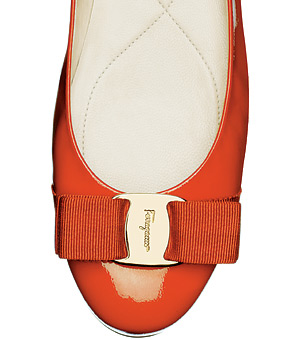
Salvatore Ferragamo, Varina ballet flat, $395
Meet Mrs. Wanda, Mr. Ferruccio, Mr. Massimo, Mr. Leonardo and Mr. James. In the medieval Florentine palazzo that is the world headquarters of Salvatore Ferragamo S.p.A., only one key executive is referred to by his surname. That is because Michele Norsa, CEO and group managing director, is the first outsider to hold a leading managerial position in this famous Italian family firm. To avoid confusion in the sumptuous surroundings where the company has been based since 1938, all of the Ferragamo family members are referred to with a Mr. or Mrs. in front of their first name.
The Ferragamo clan members are a united bunch and are in agreement that now is a time for change. The company is gearing up for an IPO late next year with Norsa, who was most recently the CEO of Valentino and is here to implement the professional structure that a public offering requires. The product range is expanding, there's a new ready-to-wear designer on board (the Spaniard Cristina Ortiz, who is ex-Prada and Brioni) and a schedule of store openings is slated for the U.S., Europe and emerging markets like China and Russia. But the soul of the business is, and will remain, the shoes on which this company's fortunes were founded. "Of course, the shoe business may not be as attractive as our handbags from a shareholder's point of view, because of sizes and a smaller initial markup," says James, the director of women's leather goods. "But at our core are beautifully crafted shoes. While today the word luxury is being used for everything from toilet paper to cars, we can talk about things that are unique to us." His uncle Leonardo, who oversees the financial side of the group, puts it thus: "It's not difficult to expand when you have a product that is respected and appreciated."
That product has come a long way since the family patriarch first fell in love with shoes. The history is this: in 1907 a 9-year-old boy, the 11th of 14 children in a peasant family, saw his mother weep because she had no money to buy First Communion shoes for two of her daughters. So little Salvatore sat up all night and made them. By 13, he had his own shoemaking business, and by his early 20s, he was in Hollywood making shoes for the stars of the silver screen. He returned to his homeland in 1927 in search of the "made in Italy" level of craftsmanship on which the company still depends—and which he applied to the shoes that bore his name once he could no longer make every single pair with his own hands. Although this enterprise initially drove him to bankruptcy, Salvatore rose again to become the shoemaker of choice for Ava Gardner, Eva Perón and Greta Garbo.
When Salvatore Ferragamo died suddenly in 1960 leaving behind six children, it was assumed that his young widow would sell the company. But Mrs. Wanda—as the 85-year-old is known today—proved a steely businesswoman and also possessed a great eye for real estate. Her dna is evident in the next generation. In addition to their private homes, among the five remaining children (sister Fiamma, who designed the best-selling Vara pump with its gold plaque and grosgrain ribbon, died in 1998), the Ferragamos own several palazzos and four hotels in Florence and one in Rome (with more on the drawing board). There are also Il Borro, a Tuscan vineyard that has accommodations for 130 guests; and an ancient castle, Castiglion del Bosco, which, when restoration is complete, will provide some of the most sumptuous guest accommodations anywhere in rural Tuscany.